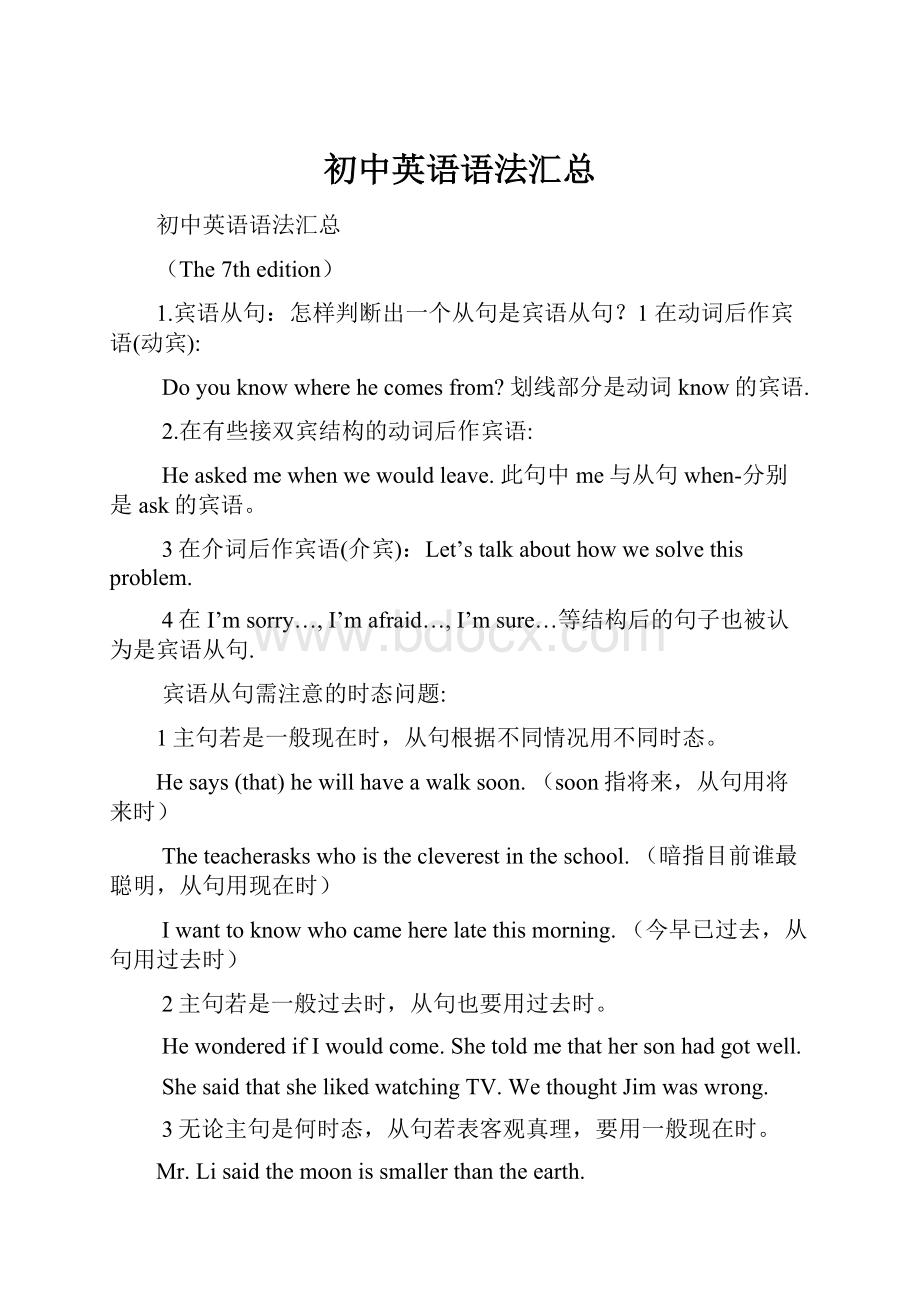初中英语语法汇总.docx
《初中英语语法汇总.docx》由会员分享,可在线阅读,更多相关《初中英语语法汇总.docx(46页珍藏版)》请在冰豆网上搜索。

初中英语语法汇总
初中英语语法汇总
(The7thedition)
1.宾语从句:
怎样判断出一个从句是宾语从句?
1在动词后作宾语(动宾):
Doyouknowwherehecomesfrom?
划线部分是动词know的宾语.
2.在有些接双宾结构的动词后作宾语:
Heaskedmewhenwewouldleave.此句中me与从句when-分别是ask的宾语。
3在介词后作宾语(介宾):
Let’stalkabouthowwesolvethisproblem.
4在I’msorry…,I’mafraid…,I’msure…等结构后的句子也被认为是宾语从句.
宾语从句需注意的时态问题:
1主句若是一般现在时,从句根据不同情况用不同时态。
Hesays(that)hewillhaveawalksoon.(soon指将来,从句用将来时)
Theteacheraskswhoisthecleverestintheschool.(暗指目前谁最聪明,从句用现在时)
Iwanttoknowwhocameherelatethismorning.(今早已过去,从句用过去时)
2主句若是一般过去时,从句也要用过去时。
HewonderedifIwouldcome.Shetoldmethathersonhadgotwell.
ShesaidthatshelikedwatchingTV.WethoughtJimwaswrong.
3无论主句是何时态,从句若表客观真理,要用一般现在时。
Mr.Lisaidthemoonissmallerthantheearth.
4宾语从句无论有何引导词,句子都要用陈述句语序。
CouldyoutellmewhenyouwillgetbacktoWuhan?
(不是willyou)
Doyouknowwhichsweatersheiswearing?
(不是isshe)
2.状语从句:
此处所说的状语从句用法仅包括条件(if和unless引导)状语从句和时间(when等引导,见下文)状语从句。
状语从句需注意以下问题:
1主句若是一般将来时、祈使句或含不表过去的情态动词等,则if(如果),unless(除非),when(当…的时候),assoonas(一…就…),before,after,until,till,as(当…的时候)所引导的状语从句用一般现在时。
Youmaytakearestwhenyoufinishdoingyourwork.(主句有情态动词,从句用现在时)
CouldyoulookaftermysonafterIleavehome?
(情态动词could是为了让语气委婉,并不指过去时,从句仍用一般现在时)
Iwillgooutassoonasitstopsrainingthisafternoon.
(主句是将来时,从句用一般现在时)
Waitforyourbrotheratthebusstationuntilhearrives.(主句是祈使句,从句用现在时)
2而主句若是一般过去时,从句也要用表过去时的适当时态,如:
IwouldgivethemoneytothecharityifIhadamilliondollars.
Whenhegottothepark,hisclassmateshadleft.
Mysonrantowardsmeassoonashesawmeonthestreet.
3.定语从句:
定语从句是指修饰前面名词或代词的句子。
从句前面的名词或代词叫先行词,从句中的引导词叫关系代词或关系副词。
关系代词who只指人,which只指物。
that既可指人又可指物。
whose后必须跟有名词,既指人,也可指物。
关系词作主语时,不可省略,作宾语时可省略。
whom只指人,只作宾语。
关系副词where指“在那里”,when指“在那时”。
(以下所给例子凡斜体字部分均作定语从句。
)
Sheisagirlwho/thatisbeautifulandkind-hearted.Thegirlwho/thatistallismysister.
(以上关系词作主语,不可省略。
)
Sheisagirl(who/whom/that)Iknowverywell.(关系词做know的宾语,可以省略。
)
Thatboywhosehairisverylongismybrother.Iownabikewhosepriceishigh.
(关系词whose表所属,后需接名词。
前句指人,译为“这个孩子的”;后句指物,译为“这个自行车的”。
)
Iboughtawatch(which/that)Ipaid100yuanfor.(指物,作pay的宾语,可以省略。
)
Ipreferaplacewhich/thatiscleanandquiet.(关系词译为“这个地方”,主语,不可省)
IpreferaplacewhereIcanliveaquietlife.(关系词译为“在这个地方”,是地点副词。
)
Ishallneverforgetthedaywhenaboyhelpedmefindmydog.(“在这一天”,是时间副词)
4.wish和hope:
1wish既可接todosth.也可接sb+todosth.也可接that从句.
IwishtospendmysummerholidayinQingdao.IwishyoutojoinmypartythisSunday.
Iwish(that)Icouldbeascientist.(注:
接that从句时,从句用虚拟语气。
)
2hope接todosth.或that从句.但不接sbtodosth.
Ihopetoreceivealetterfromyousomeday.Ihopeyouwillgetwellsoon.
Ihope(that)everythinggoeswell.(接从句时不用虚拟)
5.thanksfor和thanksto:
Thanksforyourhelpingmewiththework.
(表达对对方为自己做了某事的感谢,后无补充的结果。
)
Thankstoyoursuggestion,Ididn’tmakesuchmistakes.
(表达感谢由于某方所做的有利的事,出现了后面的结果。
)
6.感官动词用法之一:
see,hear,listento,watch,notice等词,后接宾语,再接动词原形或ing形式,分别表全过程和正在进行。
句中有频率词时,以上的词也常跟动词原形。
IheardsomeoneknockingatthedoorwhenIfellasleep.(我入睡时有人正敲门)
Iheardsomeoneknockatthedoorthreetimes.(听的是全过程)
Ioftenwatchmyclassmatesplayvolleyballafterschool.(此处有频率词often)
若以上词用于被动语态,后面原有动词原形改为带to不定式:
Wesawhimgointotherestaurant.→Hewasseentogointotherestaurant.
Iheartheboycryeveryday.→Theboyisheardtocryeveryday.
中学英语语法总结2
7.感官动词用法之二:
look,sound,smell,taste,feel可当系动词,后接形容词。
Helooksangry.Itsoundsgood.Theflowerssmellbeautiful.Thesweetstastesweet.Thesilkfeelssoft.Ifelttired.Theyalllookedtired.
这些动词都不用于被动语态。
如:
Thesweetsaretastedsweet.是错误的。
注意:
如果加介词like,则后不可接形容词,而接名词或代词:
Helookslikehismother.Thatsoundslikeagoodidea.Itsoundslikegreatfun.
Itsmellslikeaflower.Ittasteslikesalt.
8.find和think部分用法:
find/think+宾语+宾语补足语。
(代替宾从)
宾补有以下情况:
1.名词短语Johnfoundhissonacleverboy.
2.形容词短语Mrs.Smiththinksherhusbandkindoflazy.
3.有时宾补后可接带to不定式Ifoundithardtofoolthegirl.
9.wouldlike/want/feellike:
1wouldlike,和want类似:
◇都可接名词短语:
Iwouldlike/wantanotherthreedesks.
◇都可接带to不定式:
Iwouldlike/wanttogooutforawalk.
◇都可接sb,然后再跟带to不定式:
Iwouldlikeyoutogivemeahand.
2feellike:
◇后也可接名词短语:
Doyoufeellikesometea?
◇后若接动词,须用动词ing形式:
Doyoufeellikehavingawalk?
Idon’tfeellikedrinkingtea.【注:
feellike常用于疑问句或否定句中。
】
10.词序易错的短语:
1形容词修饰不定代词或不定副词,形容词在后面。
Isthereanythingdeliciousinthefridge?
Nothingserious.
Thereissomethingwrongwiththecomputer.Iwanttogosomewherewarm.
2else修饰疑问词和不定代词、不定副词,也放在后面。
Whatelsecanyouseeinthepicture?
Whoelseisintheroom?
Doyouhaveanythingelsetosay?
Whereelsecanyouseeit?
3enough修饰形容词和副词,enough放在后面。
Thissweaterischeapenough.Nemoisoldenoughtowork.
Heranfastenoughtocatchupwiththedog.Shedoesn’tlistencarefullyenough.
11.对“评价”、“天气”的提问之区别:
1Whatdoyouthinkof…?
=
Howdoyoulike…?
=How/Whatdoyoufeelabout…?
“你对…怎么看?
”(How…?
句中有like,是动词。
)
2What’stheweatherlikein…?
=Howistheweatherin…?
“…的天气什么样?
”
(What…?
句中有like,是介词,“像”。
而How…?
句中无like.)
12.take,cost,pay,spend区别:
1It+take+sb+sometime+todosth:
Ittookushalfanhourtocutdownthetree.
2物+cost+sb+钱:
Thebagcostmethirtyyuan.
若cost后无sb,则译作“价钱是”:
Thebagcosts30Yuan.
3人+pay+sb+钱+forsth:
Ipaidtheseller200Yuanforthebike..
(pay后所加内容可视具体情况取舍。
切记for后接的是物,而不是人或钱。
)
4人+spend+时间/钱+onsth/(in)doingsth.
Thegirlspenttwohours(in)searchingtheInternet.
Thegirlalwaysspendsmuchmoneyonherclothes.
spend有时可指“度过”:
spendholiday/weekends/winter
中学英语语法总结4
18.later/after/ago/before:
1later“…时间后”结构:
时间段+later
常用于一般过去时。
TheywenttoBeijingfivedayslater.
(later前无时间段,单独在句尾,常用于将来时:
I’llseeyoulater.)
2after“…时间后”结构:
after+时间段,常用于一般过去时,和1相同。
TheywenttoBeijingafterfivedays.Thedogdiedafteraweek.
(after也可加句子,但主句不一定用一般过去时:
I’llsendyouane-mailafterIgethome.
Returnittomeafteryoufinishit.见2.)
3ago“…时间前”结构:
时间段+ago,用于一般过去时。
TheGreensmovedtoShanghaifourweeksago.Isawittenminutesago.
(若有since+时间段+ago,常用现在完成时:
Mr.Lihasworkedheresince5yearsago.)
4before单独放在句尾,常用现在完成时:
“以前”
IhavebeentoLondonbefore.Hehasseenthefilmbefore.
(若是时间段+before,常用过去完成时,“…前”:
Ihadseenthefilmtwoweeksbefore.Wehadfoundouttheanswertotheproblemanhourbefore.)
19.四季:
spring春;summer夏;autumn秋;winter冬;season季
20.月:
January,一月;February,二月;March,三月;April,四月;May,五月;
June,六月;July,七月;August,八月;September,九月;October,十月;
November,十一月;December,十二月。
21.星期:
Sunday,周日;Monday,周一;Tuesday,周二;Wednesday,周三;Thursday,周四;Friday,周五;Saturday,周六。
Sunday是一周的第一天,Saturday是最后一天。
22.“也”:
either,用于否定句的末尾。
also,通常挨着动词,少用于句尾。
too,通常在句尾,前常有逗号。
aswell,只用于句尾,前无逗号。
注意:
后三个词都不用于否定句。
23.带to不定式用法之一:
带to不定式有逻辑宾语在前时,to后动词用及物动词;不及物时需跟介词。
Theworkistoohardformetodo.(work做及物动词do的逻辑宾语)
—6—
Ihavenothingtosay.(nothing做及物动词say的逻辑宾语)
Ihavealettertowrite.(letter是及物动词write的逻辑宾语)而以下情况有介词:
Ihaveapentowritealetterwith.(用钢笔写信,所以要有“用”字,故加with.)
Thezooisnotagoodplaceforanimalstolivein.
(“住在动物园里”,zoo是livein的逻辑宾语,故不及物动词live加介词in.)
Tomhasnofriendstotalkto.(friends是talkto的逻辑宾语,to不可少。
)
Herunstoofastforustocatchupwith.(he是catchupwith的逻辑宾语,带with.)Therearenoseatstositon.(坐在座位上,故sit后要加on.)
24.(a)little/(a)few:
1few,little“几乎没有;少”否定词。
few加可数名词复数,little加不可数名词。
Thereislittlewaterinthebottle,isthere?
(前否定,后肯定)
Tomissoshythathehasfewfriends.
2afew“一些”肯定词,加可数名词复数;alittle“一些;一点”也是肯定词,加不可数名词。
TomisnotanEnglishman,butheknowsalittleEnglish.
3另外,在too,very,so等词后用few,little;在only,just,still等词后用afew,alittle.而quiteafew/alittle都译为“很多”,分别相当于many和much.
(注:
有时alittle…..并不是固定短语。
如:
alittlesheep译为“一只小羊”)
中学英语语法总结5
25.及物动词+副词:
puton(穿上)/putoff(推迟)/putaway(把…整理好)/putup(举起,搭起,挂起,张贴)/putdown(放下)/putout(扑灭);breakdown(损坏,倒塌);
turnon(打开)/turnoff(关闭)/turnup(调大)/turndown(关小);getback(取回);
useup(用光);cutup(切碎)eatup(吃光)sellout(卖完)cheerup(振作)
giveaway(赠送)/giveout(发放)/giveup(放弃)/giveback(归还);pickup(捡起、拿起)
tryout(验证)/tryon(试穿);ringup/callup(打电话);cleanup/out(打扫干净);
setup(成立);thinkup(想出;想起);handin(上交)/handout(分发;散发);
fixup(修理);workout(算出)dressup(打扮);helpout(帮人解决);
keepoff/keepout(阻止;挡住);takeoff(脱下)/takeaway(拿走)/takeout(拿出);
lookup(查找)/lookover(仔细查看);throwaway/off(抛弃)wakeup(叫醒);writedown(写下);letdown(使沮丧);makeup(编造、组成);setoff(激起、触发)
注:
名词做以上短语的宾语,可放在它们中间或后边;而代词做宾语,只放在中间。
26.as……as用法:
中间加形容词和副词原级。
1和…一样…Hisroomisasbigasmine.
HerunsasfastasIdo/me/I.Youshouldkeeptheroomascleanasyourbrother’s.
2as…aspossible/sbcan“尽可能…”Wewentthereassoonaspossible.
Listentotheteacherascarefullyasyoucan.Hewentthereasquicklyashecould.
3有些短语有几个意思:
assoonas和…一样快;一…就…;asmuchas和…一样多;多达;aslongas和…一样长;长达;只要;aswellas和…一样好;和…一样;
asfaras远达;就…来说;
也可表示倍数:
Thisroomistwiceasbigasthatone.这个房间是那个房间的两倍大。
27.prefer用法:
prefersthtosth或preferdoingsthtodoingsth.“比起…更喜欢…”
prefertodosthratherthandosth宁愿…也不愿…
若单独一个prefer,和like用法类似,后接todosth或doingsth“更喜欢做某事”
28.some-,any-,every-用法:
1some-“某~,一些~”,用于肯定的陈述句中。
Ihavesomethingtotellyou.Maybesomebodyhastakenit.
若用于疑问句中表示期待对方肯定的回答或表示请求或建议.
Whynotasksomebodytohelpyou?
Shallwegivehimsomethingtoeat?
Whataboutsomemilk?
Couldyoupleaselendmesomechairs?
Willyoubuymesomebooks?
MayIgiveyousometea?
Wouldyoulikesomemilk?
在一些”dosome…”短语中,即使是疑问句中,some也不变为any.如:
Willyoudosomew